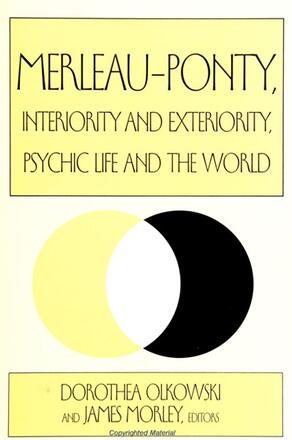
Merleau-Ponty, Interiority and Exteriority, Psychic Life and the World
Alternative formats available from:
Explores Merleau-Ponty's approach of taking the phenomenon of the body out of the dualistic constraints of interior and exterior, and the consequences thereof.
Description
This book demonstrates how Merleau-Ponty's understanding of the continuity of inner and psychological life (interiority) and the material world (exteriority) has broad implications for philosophy, the physical and human sciences, and health studies. By taking the phenomenon of the body out of the dualistic constraints of interior and exterior, idealism and empiricism, Merleau-Ponty shows us the possibility of a fresh vantage point for future research and therapeutic application, linking philosophy more closely to the study of nature, the psyche, and social phenomena. Merleau-Ponty, Interiority and Exteriority, Psychic Life and the World is proof of the power and creative energy of Merleau-Ponty's thought.
Contributors include Edward S. Casey; Helen A. Fielding; Elizabeth Grosz; Lawrence Hass; Galen A. Johnson; Nobuo Kazashi; Alphonso Lingis; Glen A. Mazis; James Morley; Dorothea Olkowski; David E. Pettigrew; James Phillips; Michael B. Smith; Gail Weiss; and Wilhelm S. Wurtzer.
Dorothea Olkowski is Associate Professor of Philosophy at the University of Colorado. She is the author of The Ruin of Representation, Gilles Deleuze and Feminism and Creative Life and is coeditor, with Constantin V. Boundas, of Gilles Deleuze and the Theater of Philosophy. James Morley is Senior Lecturer in Psychology at Richmond College, The American International University in London.
Reviews
"…it presents a variety of diverging perspectives … [and] does an excellent job of representing the colloquy of the International Merleau-Ponty Circle. " — International Studies in Philosophy
"Olkowski and Morley gather in one volume some of the freshest and creative voices among contemporary Merleau-Ponty scholars. A wide range of thinkers (Schelling, Freud, James, Heidegger, Levinas, Butler, Irigaray, Derrida, Lacan, etc. ) and integrated themes (feminism, chaos theory, intersubjectivity, the unconscious, etc. ) are represented here. This work would be useful as collateral reading for a variety of courses in contemporary continental philosophy. " — Patrick Burke, Seattle University